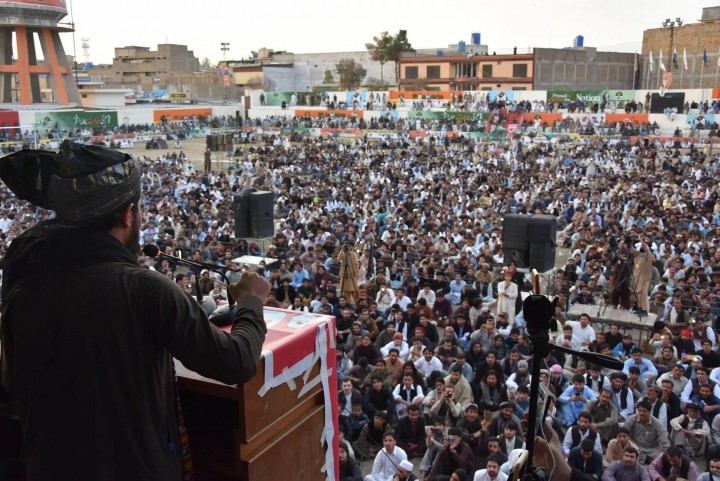NAYANIMA BASU
Lt Gen. Hameed Faiz was appointed ISI chief Sunday. India will closely watch how he steers ties between ISI and terror outfits Jaish and Lashkar.
Cutting short the tenure of spymaster Lieutenant General Asim Munir, the Pakistani Army Sunday appointed Lt Gen. Faiz Hameed as the
new director general of the country’s military-led spy agency Inter-Services Intelligence (ISI).
From being at the centre of a storm during the 2018 Pakistan elections to engineering the Faizabad agreement in 2017, Hameed has been controversy’s favourite child.
The ISI, which was created in 1948 after the first India-Pakistan war over Kashmir, is today seen as the neighbouring country’s de-facto decision-making body that calls the shots in Islamabad’s internal and foreign policy decisions.
Hameed will be directly reporting to the Army chief, even though appointment to the post of ISI’s director general is finalised by the country’s prime minister in consultation with its Chief of Army, according to their constitution.
But ever since former Pakistan President Zia-ul-Haq, who was also Chief of Army, took over the helm of the country’s government in 1978, the ISI chiefs started reporting to the Army chiefs and not the PM.
The only exception to this rule happened during late Pakistan Prime Minister Benazir Bhutto’s regime when retired Lt Gen. Shamsur Rahman Kallue was made the ISI chief in 1989, for a brief period.
Surprise appointment
Hameed’s appointment came amid a sudden reshuffle within the Pakistani army and ISI ranks. As the new ISI chief, Hameed will be replacing Munir, who has been shunted out as Commander Gujranwala Corps in Punjab. Munir had been in the coveted post only for eight months.
Hameed’s new designation comes two months after he was promoted as Lt Gen. in April and appointed Adjutant General at the Pakistan Army headquarters. He had previously served as head of ISI’s internal security.
Engineering defections and Faizabad agreement
Hameed was at the centre of a roaring controversy during the 2018 Pakistan elections when former Prime Minister Nawaz Sharif accused him of ‘clandestinely’ supporting current present Prime Minister Imran Khan’s Pakistan Tehreek-e-Insaf (PTI) party.
Hameed was accused of instrumenting defections from Sharif’s Pakistan Muslim League (Nawaz) party to Khan’s PTI.Not surprising then, that this sudden promotion comes as a long pending reward to him by the Khan-led government.
Hameed’s claim to fame, however, is the Faizabad agreement in 2017. He had brokered the deal between sit-in protestors from various religious factions and the then PML-N government. The agitators were were protesting amendment to the country’s Election Act 2017. The protestors had seized Islamabad, paralysing normal life, for nearly a month. It was Hameed who had signed the agreement in the capacity of a ‘guarantor’ for the Army.
Faizabad protests are believed to have further widened the gap between civilian and military apparatus in Pakistan.
Challenges facing new ISI chief
Hameed will be closely watched by India and other nations on how he steers the controversial relationship between ISI and Pakistan-based terror outfits such as Jaish-e-Mohammed and Lashkar-e-Taiba, both of which are proscribed by the United Nations.
It also will be crucial for India to watch Hameed’s role in balancing out the role of, what is infamously known as, the ‘
Directorate S‘ — the ISI wing responsible for covert action in India or Afghanistan.
Pakistan has also been facing an imminent danger of being blacklisted by the Paris-based Financial Action Task Force (FATF) for funding terrorists — a development that can seriously cripple the country’s already dwindling economy.
Calling him a “decisive, firm and out of the box strategist”, Jan Achakzai, an Islamabad-based political analyst and former advisor to the Balochistan government, said Hameed’s key challenge will be to watch and shadow Pakistani government’s foreign policy towards India and its activities in Kashmir.
“The new ISI chief will be looking for ways to raise export and import costs for India. One area where he will likely checkmate Delhi is the Afghan chessboard. Another is Iran, since both Tehran and Delhi’s closed alliance was battered after India bowed down to US’ pressure to not buy oil from the former,” Achakzai added.
But a foremost challenge for Hameed will be to control the growing Pashtun resistance, under the aegis of the Pashtun Tahafuz Movement (PTM), that has created a rift between Pakistan’s military and political establishments.
Director General (DG) Inter-Services Public Relations (ISPR) Asif Ghafoor, also spokesperson of Pakistan Army, had earlier this year blamed Indian and Afghan intelligence agencies for funding the PTM.
“Hameed is another hardliner who would try to plug the domestic holes more ferociously – issues such as internal dissent cropping up due to PTM, Baluch, political parties at variance. He will also have to ensure extension of the COAS and keep the religious parties in better control of the military,” said Ayesha Siddiqa, research associate at the Centre for International Studies and Diplomacy, SOAS, University of London and author of Military Inc.: Inside Pakistan’s Military Economy.




